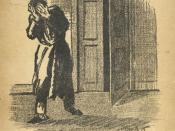The Dehumanization of America Living in America, we experience comfort, luxury, and independence. Essentially, we are able to think how we want to think and live how we want to live without ever having to worry about some petty act of violence or other misconduct befalling us. We are in control of our own lives. Because of our incredibly fortunate situation, it has become nearly impossible for us to grasp the adversity that people in all other walks of life have to deal with. The short stories Rape Fantasies, The Metamorphosis, and The Lottery each help illustrate that the people of America have truly become desensitized.
In Rape Fantasies, by Margaret Atwood, several women give their own portrayal of what it would be like to be raped. It becomes abundantly clear that without experiencing the horrific terror of rape, you cannot come close to understanding what it feels like. Some of the women in the story actually see rape as some sort of bizarre sexual fantasy.
They can't relate to the millions of women who have been raped because it has never happened to them. It is not within their grasp of reality. Even the levelheaded narrator cannot imagine a rape scenario in which she doesn't regain control of the situation. Margaret Atwood attributes many of these misinterpretations of rape to the media. She makes a point of how magazines take a light-hearted approach when dealing with serious topics, and consequently they make unspeakable actions seem trivial and insignificant.
The Metamorphosis, by Franz Kafka, also makes the point that it is hard for us to sympathize with problems that we have not yet faced. In this story the main character, Gregor, is transformed into an enormous bug. Before the metamorphosis occurs, Gregor is the sole provider for his family, but afterwards he is left incapacitated and helpless. This overnight change can be interpreted as someone growing old and senile, someone falling victim of an accident and being left crippled, or any other situation in which a person becomes a general burden to the people around him. In The Metamorphosis, Gregor's family forgets about everything he did for them in the past and they grow to despise him. The same thing often happens to the elderly in America. They raise us, they take care of us, they love us, and we claim to be indebted to them. The second they grow too old to take care of themselves, we put them in an elderly home and demean their entire existence into two or three uncomfortable visits a year. Subconsciously we think that we are going to be fully functional for the rest of our lives. Nevertheless, with our poor health habits and our "I'm going to do what I want at the cost of anything"� mentality, my generation will probably be twice the burden that our grandparents are on us. Still we can only think about our unheroic demise for a second before we put the thought out of our mind because we know that we're never going to face this same predicament. We all believe that it can't possibly happen to us.
The character Tessie Hutchinson in Shirley Jackson's The Lottery is the perfect example of how we are able to stomach the inhumane until we find ourselves the victim. In The Lottery, a small and relatively unimportant village participates in a sadistic ritual where the loser of a random drawing is stoned to death by their neighbors, friends and loved ones. Tessie Hutchinson, who grew up in the small village, took part in the atrocious festivities every year of her life, and she probably enjoyed the lottery as much as everyone else. She was only able to come to grips with the evil of the whole affair after she herself had lost the lottery. When her family was selected, Tessie cried out, "You didn't give him time enough to take any paper he wanted. I saw you. It wasn't fair"� (Jackson 743). Every other year she had found the lottery fair. Every other time she heard men, women, and children crying for mercy, she thought they were just poor sports who didn't understand the concept of the few suffering for the good of the majority. Many citizens of America have similar outlooks on other nations. One example of this "As long as it's not me"� mindset is war. For the most part, Americans have few qualms with war. As long as it's not our friends and family fighting off in the Middle East, and it's not our peaceful town getting blown to hell, most will agree that war is great. The fact that innocent people we've never met are paying the price with their lives (because self-indulging politicians thousands of miles away from them have deemed their suffering as necessary) seems perfectly normal. As long as gasoline prices stay low, the American public apparently sees these deaths as acceptable means that are justified by the end. But what if it was our home that was a constant war-zone? What if it was our land being raped of its resources to satisfy the gluttonous appetite of complete strangers living an eternity away? It is highly unlikely that we would find the situation necessary or fair. But it seems that until we face these same problems, we will continue making these third world countries our bitches without ever really thinking twice.
The fact that we are not living in oppressed, poverty-ridden countries is something that we all take for granted. We never know when we will be the ones getting raped, getting put in an old folks home, or having our homes raided by sadistic militiamen. Atwood, Kafka, and Jackson each make a point that it has become way too easy for us to stand oblivious to the problems facing the rest of humanity. Our inexperience with suffering has left us naÃÂïve and unprepared to deal with actual affliction. Much like Tessie Hutchinson, if we continue to ignore the injustice placed on others, we will have no grounds to oppose the same injustice placed on ourselves.
Works Cited Cassill, R.V., ed. The Norton Anthology of Short Fiction. New York: W.W. Norton & Company, 1990.
Atwood, Margaret. Rape Fantasies. Cassill 10-18.
Jackson, Shirley. The Lottery. Cassill 738-745.
Kafka, Franz. The Metamorphosis. Cassill 842-881.





